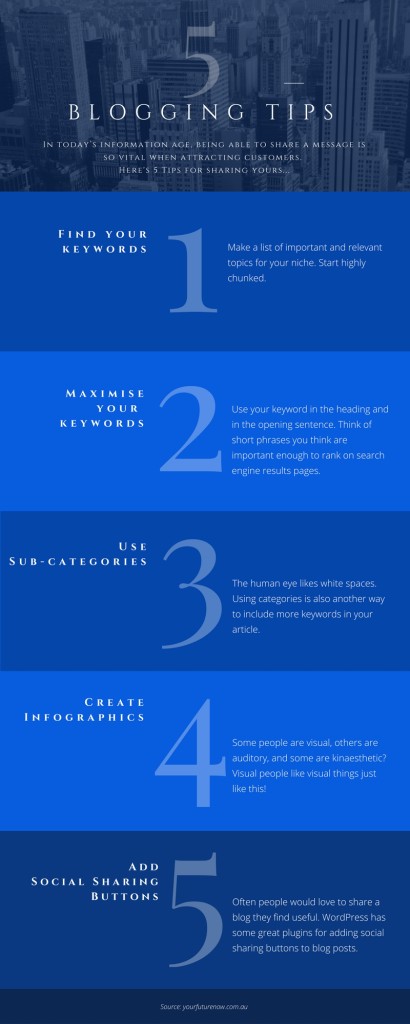

How To Write A Blog
Table of Contents
In today’s information age, being able to share a message is so vital when attracting customers, however not many people are ever taught how to write a blog, what a keyword is, and how to find keywords for their niche.
Completely overwhelmed, many people decide that learning how to write a blog is too hard, and they ignore a vital means for attracting their ideal client.
How To Find Blog Keywords
Think about any time you want to look something up on the internet. Chances are, you open Google, and type in what you’re looking for. In the blink of an eye Google gives you what it believes are the most relevant results based on the words you entered.
What you need to do is make a list of important and relevant topics for your niche. Start highly chunked. If you’re a coach you may want to start with topics such as ‘Neuro Linguistic Programming’, ‘Life Coaching’, ‘Goal Setting’, and so on…
At this point, staying highly chunked, you want to put yourself in your avatar’s shoes. What are they searching for? What are they looking for solutions to? What problems can you solve for them? This is a brilliant opportunity for you to be the eavesdropper. Next time you go to a café, take along a notepad and pen. Leave your phone in your pocket, and just listen in to conversations. What are people complaining about?
Refine Your Blog Keywords
Now that you have a list of keyword categories, it’s time to start chunking down and get really specific on what your avatar is searching for. Try to think of short phrases you think are important enough to rank on search engine results pages. If we use ‘Goal Setting’ as an example, sub-categories for keywords (and therefore blog ideas!) could be ‘goal setting for weight loss’, ‘how to set goals’, ‘steps to reach your goals’.
If you’re having trouble thinking of keyword search terms, have a think about conversations you have had with clients or phrases people used in strategy sessions, and see if you can incorporate those into your list.
Then you need to select keywords that you have a chance of ranking for. You can use free tools like www.moz.com, www.rankscanner.com and www.semrush.com to find the words you are already ranking for in Google searches that are perhaps not yet on the front page (ranked under 10). These are words you’re going to want to use more in your upcoming blogs, as you know people are already finding your website through these words.
Then you want to use the Google keyword search tool to decide what the focus keyword or phrase should be and which other keywords to use – you are looking for good search volumes in your target geographic area that have low competition. You need to look for keyword combinations that rank competition as low.
How To Write A Blog
Much like when you write your personal story at Entrepreneur Now, your blog wants to have three key areas. The opening paragraph outlines what the problem is and how you plan to solve it. Here you want to let your reader eat their dessert first. Attention spans are short, latest research suggests around eight seconds, you need to capture your reader’s attention quickly.
In the middle, you serve up your meat and potatoes. If you promised five keys to goal setting, you list your five keys and explain each one thoroughly here.
At the end, you summarise the learnings. You can also use the closing paragraphs to ask for what it is you want. If you want your reader to comment, invite them. If you want them to share your article on their social channels, ask them. Because you have given the reader such great value with your content, they will be happy to share it, because people like helping people!
Blogging Tips
There are several things you can do today to tidy up your blog and get it on Google’s radar, which will, in turn, get more eyeballs on your posts, which leads to more customers.
1. Use your keyword in the heading and in the opening sentence. Scroll back up to the top of this article called ‘How To Write A Blog’…
2. Break your text into categories. The human eye likes white spaces. Blocks and blocks of text are overwhelming. Using categories is also another way to include more keywords in your article.
3. Use infographics. Remember how some people are visual, others are auditory, and some are kinaesthetic? Visual people like visual things. Use a free tool such as Canva to create a nice infographic that summarises the main points you make in your blog.
4. Add social sharing buttons to your posts. Often people would love to share a blog they find useful, but the blogger makes it hard for them. WordPress has some great plugins for adding social sharing buttons to blog posts.
By consistently blogging on your website, you become a trusted source of information in your niche. This helps you to become the authority. Author is the first word in authority, and you are the author of your own story.
Now it’s time to take action, follow the above steps, and write a blog! When you’re done, share it with us on the Live it Now Facebook page.
Kindest regards,
Matt Catling







